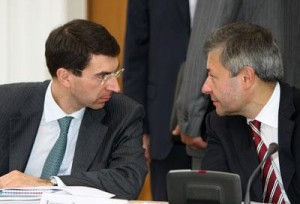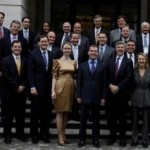Archive for the ‘Innovation & Investments’ Category
Taisiya came to me this summer. She said “I need a mentor. Are you ready to share your experience?” I was very happy that our startUpers had active and rational approach, though, and I agreed. I didn’t have enough time in my daily schedule, but Taisiya was calling and writing me all the time. And so after all we’ve met. She told me what they have and how the process is going on. I told her what she can do with her project on Russian market and what she shouldn’t do there, shared my experience in creation of similar projects there and showed her the prospects of this project. Taisiya wrote everything down thoroughly and some things she’s remembered. Then she went to the Valley. I asked her how things are going there and why they go in that way. Below you can see a brief and clear description of the Taisiya’s project.
Russian yelp.com? No, it’s tulp.ru!
I came to the Valley in autumn of 2010. I found an apartment pretty quickly – and started looking around. I was interested in communities and people, ready to invest into an actively developing Russian startup. I had something to propose and to interest in. My project tulp.ru is a Russian analog of yelp.com, a social network, an online library of reviews, a storage of people’s experience and a guide to companies and places of the country. And this project grew faster than it had been planned.
Actually, things were not so cheerful at the beginning. The first tulp.ru incarnation was released at the beginning of 2010. That time the site was a kind of a functional copy of yelp.com with a strong bias in favor of female audience. The first tulp.ru suffered from non-transparency of navigation, lack of distinct structure, and the team was physically unable to get rid of hordes of bugs. No wonder that portal’s traffic got hopelessly stuck in 200-300 unique visitors per day; and business representatives failed to understand, of what use the site could be for them.
Tulp.ru 1.0 is gone. Long live tulp.ru 2.0! By July 2010 there happened a kind of a little system revolution. Yelp.com experience was significantly reconsidered and transplanted onto Russian ground – accounting mentality, economic, social and cultural features of Runet users. Russian baby was moving further and further from his American parent. Tulp.ru has been redirected: now only about 60% of its users are women. Geek ambitions were sacrificed for the sake of simplicity and convenience. Having examined key tendencies of Runet, tulp.ru team stoke on “newbies”, who make up the largest part of new Runet users.
Developers’ team was fully replaced. Designers and UI specialists joined into the work. The first thing done was giving users an opportunity to write reviews and fill up the catalogue of places. That’s why work with new functional and growth of volume of reviews took place simultaneously. Here yelp.com experience also turned to be useful. The army of free-lance reporters from all over Russia has been hired. There at once was discovered a positive moment: having begun to write paid reviews (at a very low price of 30-50 cents for a review), many of them became fans and enthusiasts of tulp.ru, and at the same time its first testers and first community members. From the moment of tulp.ru 2.0 release (July 2010) more than 14000 reviews have been written.
By this time basic functional for business representatives has been ready, which made it possible to make first proposals to business community. According to tulp.ru concept, small and medium-sized businesses should become the basic source of revenue. According to Economic Development Ministry, there are about 5,5 million of officially registered small businesses at present. Very few of them are ready to spend much money on advertising. And it is tulp.ru that could become a relevant and rather available connection channel with their customers, and for many of them – also a free Internet marketing school. It is supposed that a monthly check for a business user will come to $50-200, depending on the city.
Tulp.ru has already begun to sell its first services to business owners. One of them is possibility to participate in “Deal of the Week” action. It’s an analogue of “groupons”: the site places an offer to buy a good or a service with a very big discount within a very short period. A business representative pays tulp.ru for this action’s holding – and at the same time (which is not the case with “groupons”) gets all the money, gained on “groupons’” selling, – together with publicity.
One of the challenges in this plan’s realization is involvement of small business to tulp.ru. The problem is that the majority of Russian businessmen, especially regional ones, simply don’t know what Internet is about, what possibilities it may give, and how they may be used. That’s why free seminars, teaching business owners the ABC of Internet marketing, should become one of the ways of tulp.ru promotion. The first seminar has already taken place in Omsk and it has gathered a dozen of businessmen, which is very good for the first time.
At present tulp.ru is visited by about 5000 uniques per day; page views are growing 16% on average per week; the very first week of work of the business owners functional brought 35 business representatives, who has subscribed to tulp.ru services. Four of them placed discount coupons, and two more took part in “Deal of the Week”. Tulp.ru is ready to begin its active sales.
These results became achievable owing to investments of our angel investors – Valery Krivenko, High Technologies Director of “Onexim”, and Alexey Kovsh, the First Vice-President of “Optogan”.
This time I came to the Valley to find additional capital and smart investors, ready to take part in the project not only with their money, but also with their experience. On the 16th of November at Startups Demo Night “The Russians are here!” I told 150 participants of the event about plans and results of tulp.ru. I was told that it was one of the most interesting reports of the evening.
— We are capable of straddling the trend. In 2010 the consumers’ activity and growth of the army of Internet users showed a sharp tendency to rise. Crisis slackness turned into a desire to realize a pent-up demand, and people are beginning to spend their reserved money. At the same time, providers have offered the regions an unlimited Internet at reasonable prices in the long run. So you can see how Runet audience is growing. Russian users are waiting for such a resource as tulp.ru, and this resource is ready.
Watch the development of affairs!
 I am going to represent Russia at Communication On Top, a world forum in Davos and the major event in the world of communications in February 2011. The goal of the Forum is to provide a platform for discussion on the future development of communications and their role in business and politics. I will be speaking about electronic government and present a paper “Why can electronic government in Russia and the BRIC countries become a stimulus for economic development?”
I am going to represent Russia at Communication On Top, a world forum in Davos and the major event in the world of communications in February 2011. The goal of the Forum is to provide a platform for discussion on the future development of communications and their role in business and politics. I will be speaking about electronic government and present a paper “Why can electronic government in Russia and the BRIC countries become a stimulus for economic development?”
Every week I’ll present you one key-speaker of Davos Forum «Communication on Top». Today this person will be Stephen Davies. He is an online communications consultant based out of the UK. He is the founder and managing director of 3WPR – an online communications consultancy. He has worked on a number of online PR and social media campaigns for national and multinational companies and currently consults with a broad scope of clients ranging from a B2B FTSE 100 to a number of well-known consumer brands. Stephen currently acts as a consultant with Action Global Communications, the only global PR network to focus specifically in the emerging markets and
has worked on a number of initiatives in Eastern Europe, Russia and the UAE.
His professional blog – www.stedavies.com — has been recognised by industry professionals around the world and was named ‘Europe’s number one PR blog’ according to the rankings given by US publication, Adage. In 2009 he was added to the PR Week Power Book – which claims to include the top 1% most “powerful and inspirational” UK PR people. Previously he worked for the world’s largest independent PR firm, Edelman, in London and European online distribution company, RealWire.
Main topics in our skype-discussion:
- what is Communication on Top,
- advices to be a leader in Social Media,
- how to react on negative comments in your blog or social media,
- involving people in croudsourcing models with help of social media
- the most powerful resource for self PR or Company’s PR in Internet
- social media: more official or more private?
- social media or other platforms for PR in Internet?
Public service of electronic mail for communication between citizens and officials and for public services can be launched in Russia already in the end of this year.
The algorithm is simple: citizens will be able to register e-mail address at post office, wait for registration data, receive public services, and interact with civil servants. This scenario is already fulfilled in case of electronic public services through Gosuslugi.ru.
Use of public e-mail for signatures along with other e-mail addresses won’t be restricted, but use of the new service for private purposes will be prevented with all off-topic messages to other servers blocked. Signatures will be first and last names of subscribers.
Still to be defined is a solution to dilemma of names’ duplication (when 2 individuals or more can have the same first and last names), as well as e-mail boxes’ volume and choice of domain zone. Russian domain .rf suggests Cyrillic keyboard layout, which does not have the symbol “@”.
Public e-mail will be available only through web-interface, not e-mail clients. This should raise information security of new services.
Last month I was attending a project session StartupIndex. I liked People’s Taxi, but considered that requested 6.5 million are inadequate and the kids lack sales-team. Also, I criticized Face Gallery, a good project from very positive MainPeople team. They lack market strategy and knowledge of competitors.
I am both startupper and investor. Some projects make me startupper since I want to sell them to VCs, which forms good sales skills. Every investor has to have her/his own startup since this allows to grasp, if a team can manage the project: the market develops quickly and every investor wants to be involved. Also, in Russia many owners of business also work as directors, immersing themselves into operations.
Challenges: All Are Fired, Thanks To All!
Some of my startups have faced challenges. I have long worked on the creation of several mobile TV start-ups that did not go. The reasons of failure included high expectations of the market and limited frequencies. My burning eyes were enough to prove to all that it can and should work based on Western cases: 3Italy gained a large base of subscribers for mobile TV, or 46% of mobile TV subscribers in England watching it at home, having access to cable or satellite television, or MobiTV in the US received the second round of investment, etc. continue reading
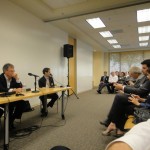 Recently I have spent all day in the Silicon Valley meeting investors. Taking pictures of the barracks and innovational cottages of the Valley made me feel striking difference between real life and what they usually see on TV about the Valley, and now I have some time to write about this gap.
Recently I have spent all day in the Silicon Valley meeting investors. Taking pictures of the barracks and innovational cottages of the Valley made me feel striking difference between real life and what they usually see on TV about the Valley, and now I have some time to write about this gap.
Beyond different appearance (neither barracks nor cottages usually get into the pictures folks see), real life is full of social events and much more interactive. Yesterday Aleksandra Markova organized my informal meeting with Russian innovators of the Silicon Valley at a caf?. Max Skibinski showed the cult shop of geeks and the barracks where startuppers start working here. In the evening, I attended reception at a cottage of investment banker. The cottage was on a mountain with a view to the Valley. People at the reception actively mingled with each other and got introduced to each other. Personally, I met positive person whose name is Natasha Krol, she has constructive and material view of Russian innovations. continue reading
Russian search engines market has been developing at fast pace and gave the world Google (American searching machine grew to 71.24% of the global market not least because of innovative ideas of Sergey Brin, a Russian ?migr?), and Yandex, a search engine which controls 64.3% of Russian market. That this competitive landscape can be diversified by a comparable market player, is dubious, but such a project with $100 million budget is being developed.
Shchegolev to Reiman: Avoid Killing Yandex, Reiman To Shchegolev: It’s Just A Market Affair
The developers‘ clients must have known the market well. Former Presidential advisor Leonid Reiman termed the project “market affair“ and “interesting topic”, admitting that the trend is to continue speech recognition research. Minister of Communications Igor Shchegolev promised to avoid “killing” Yandex with new search engine. 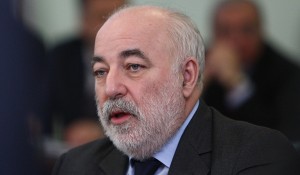 Aluminum and titan tycoon Viktor Vexelberg sees need to create in Russia “a Google a year”.
Aluminum and titan tycoon Viktor Vexelberg sees need to create in Russia “a Google a year”.
Google and Yandex have decades of history, whereas development of the new engine must be accomplished in a year. If projected into the future, such a speed promises much further to go, and competitors won’t kill Yandex, but won’t they turn the new engine upside down? Russian search engine market is growing all the more intriguing! Nonetheless, local search engines yield in popularity even in Western European countries.
If I were thinking about supporting Russian cause in the US, I would support an organization that strives to unite all Russian-speaking technology entrepreneurs and venture capital investors interested in innovation and commercialization of high technology products. However, nearly the only association of Russian-speaking innovators which can be potential candidate for this role lacks not support, but even political will or desire to have it in correct order. This association is called American Business Association Of Russian-Speaking Professionals (AmBAR).
Though the Silicon Valley itself is already pretty much an association of, not to say a home for, Russian-speaking innovators, there is an association here that deserves special attention because it was launched in 2002 by a group of business professionals and entrepreneurs, representing leading Silicon Valley companies: Sun Microsystems, Intel Capital, and Draper Fisher Jurvetson. The AmBAR membership base today includes more than 2000 business professionals.
In the spring of 2010, AmBAR brought the first ever delegation of the top Silicon Valley Venture Capitalists to Moscow. At the same time, AmBAR signed a cooperation agreement with RUSNANO. More recently, AmBAR co-hosted the Russian President Medvedev’s visit to the Silicon Valley.
Currently, AmBAR is facing some internal issues that were hoped to pass away soon. Ambar organizes Silicon Valley Open Doors (SVOD), a technology investment conference that was going to be held for the sixth time on November 11-12 2010 and devoted to Skolkovo. As a consequence of the same internal issues, the AmBAR Directors who served as the Executive Directors and Management Team of SVOD 2005 — 2009 cannot endorse any AmBAR or SVOD events until these issues are resolved, states the SVOD website. I think that such projects might have received support from proponents of Russian-speaking world and innovation.
More than 500 companies from 15 countries attended the International Ural Exhibition and Forum of Industry and Innovation INNOPROM – 2010 in Yekaterinburg and presented their innovative technologies in various sectors of the economy.
The organizers have made an interactive map of Russian innovations, showing cities in Russia currently hosting or preparing to host techno-parks, business incubators, patent offices, and scientific and educational centers. Despite common misconception that Skolkovo is the only spot of innovation on the map of Russia, there are several contenders for the title of Russian Silicon Valley.

Tomsk and Novosibirsk are well-known as scientific centres since Soviet times and the only factor that prevents them from flying away from the woods of domestic market to the sky of international market of ideas and innovations is their location in the heart of Siberia, which is unlikely to attract innovators, even from other parts of Russia, not to mention from the whole world. As for Tatarstan, one could say the same thing, but the climate there is milder, it is closer to Europe, and the government develops innovations there purposefully.
Moscow region, by and large, is not fit for the innovator because of the bad climate and ecology, as well as horribly high prices and wages which lays stamp on startups. However, the high concentration of power, money, business and science, inherited from the Soviet Union, makes this region actually a separate country, and a very innovative one, with the highest concentration of students, scholars and universities in Russia. Nearly the same applies to St. Petersburg , although the concentrations of resources there are smaller.
Kaliningrad region is on the list of innovative regions due to transport proximity to Europe and the relatively mild climate. The most interesting regions for innovations is Krasnodar region and the Far East.
The first one boasts massive investments for the Olympics in Sochi . I personally know of several innovators who prefer to spend considerable time in the warm Gelendzhik, Sochi and manage their business on the internet. But as of now, Sochi is more Russian Miami than Russia’s Silicon Valley. This city is famous for being the summer home of the elite, as well as for expensive housing and a gambling zone.
Far East is far away from Moscow, and from Europe, but has regular communication with all the countries of Southeast Asia. In Vladivostok, there are several universities, and major investments are planned for the APEC summit in 2012. Neighboring Khabarovsk Region is known as a centre of defense industry. Amur Region is notable for the fact that the spaceport is being built there, and it will be invested the same amount of money as in Skolkovo.
Which of the regions will be considered by us, the Russian Silicon Valley? Nice to think that it will appear somewhere in Krasnodar region closer to the Black Sea which will allow to swing between expensive Moscow and cheap fruits, sun and sand of Southern Russia.
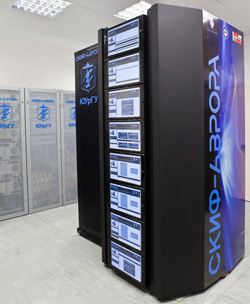 In the South Ural State University launched a supercomputer, built on a platform with liquid cooling at the board and as a consequence, virtually noiseless. Development of such systems are everywhere, but nowhere so far they have not been brought to the stage of operation, according to its creators.
In the South Ural State University launched a supercomputer, built on a platform with liquid cooling at the board and as a consequence, virtually noiseless. Development of such systems are everywhere, but nowhere so far they have not been brought to the stage of operation, according to its creators.
Supercomputer at the liquid cooling «SKIF-Aurora SUSU» is set in the South Ural State University (SUSU), Chelyabinsk. Peak performance of the machine is 24 Tflops (trillion operations per second), the real productivity — 21.86 Tflops. Now this corresponds to the eighth place in the ranking Top 50 most powerful computers in Russia and CIS
The cost of the supercomputer was 80 million rubles.The supercomputer will be used to solve problems in science, education, economy and social sphere.
For — 417
Against — 1
Yesterday at the hearing authorities and legislators finally agreed that the second reading will be held on the amendment, under which a Skolkovo can register any innovative company from any region of Russia, and get set privileges and preferences:
— Possibility of 0% VAT (optional)
— 0% profit
— 0% property
— 14% UST
— Exemption from customs duties
Russian Silicon Valley — Fund Skolkovo (http://i-gorod.ru) — a nonprofit organization created at the initiative of President of Russia for a new settlement — the center of research and scientific development and commercialization of their results. As part of the settlements established universities, research laboratories, centers of collective use, business incubator, technology commercialization center, offices and corporate research centers, along with housing for their workers and social infrastructure. Settlement activity is regulated by a special law that implies the creation of special economic conditions for residents of the project.
Massachusetts Institute of Technology (MIT) and Russia signed a historic agreement in the U.S.






